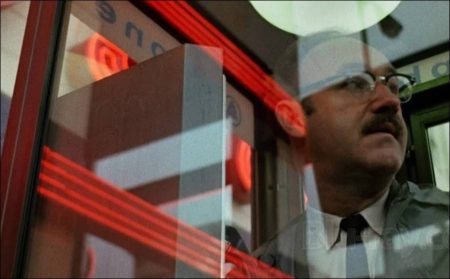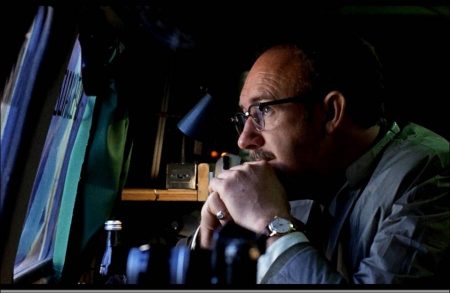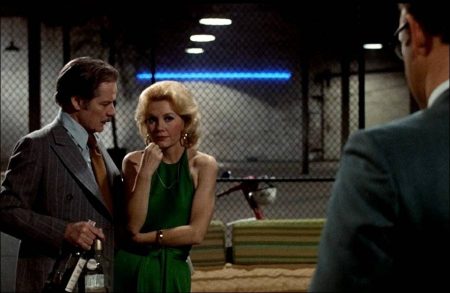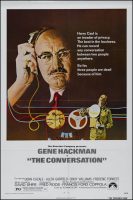Taglines: Harry Caul will go anywhere to bug a private conversation.
The Conversation movie storyline. Harry Caul is a devout Catholic and a lover of jazz music who plays his saxophone while listening to his jazz records. He is a San Francisco-based electronic surveillance expert who owns and operates his own small surveillance business. He is renowned within the profession as being the best, one who designs and constructs his own surveillance equipment. He is an intensely private and solitary man in both his personal and professional life, which especially irks Stan, his business associate who often feels shut out of what is happening with their work.
This privacy, which includes not letting anyone into his apartment and always telephoning his clients from pay phones is, in part, intended to control what happens around him. His and Stan’s latest job (a difficult one) is to record the private discussion of a young couple meeting in crowded and noisy Union Square. The arrangement with his client, known only to him as “the director”, is to provide the audio recording of the discussion and photographs of the couple directly to him alone in return for payment.
Based on circumstances with the director’s assistant, Martin Stett, and what Harry ultimately hears on the recording, Harry believes that the lives of the young couple are in jeopardy. Harry used to be detached from what he recorded, but is now concerned ever since the deaths of three people that were the direct result of a previous audio recording he made for another job. Harry not only has to decide if he will turn the recording over to the director, but also if he will try and save the couple’s lives using information from the recording. As Harry goes on a quest to find out what exactly is happening on this case, he finds himself in the middle of his worst nightmare.
The Conversation is a 1974 American mystery thriller film written, produced and directed by Francis Ford Coppola and starring Gene Hackman with supporting roles by John Cazale, Allen Garfield, Cindy Williams, Frederic Forrest, Harrison Ford, Teri Garr and Robert Duvall.
The plot revolves around a surveillance expert and the moral dilemma he faces when his recordings reveal a potential murder. Coppola cited the 1966 film Blowup as a key influence. However, since the film was released to theaters just a few months before Richard Nixon resigned as President, he felt that audiences interpreted the film to be a reaction to the Watergate scandal.
The Conversation has won critical acclaim and multiple accolades, including the Grand Prix du Festival International du Film, the highest honor at the 1974 Cannes Film Festival. It was nominated for three Academy Awards in 1974 and lost Best Picture to The Godfather Part II, another Francis Ford Coppola film. In 1995, it was selected for preservation in the National Film Registry by the Library of Congress as being “culturally, historically, or aesthetically significant”.

About the Story
Harry Caul (Gene Hackman) is a surveillance expert who runs his own company in San Francisco. He is obsessed with his own privacy; his apartment is almost bare behind its triple-locked door and burglar alarm, he uses pay phones to make calls, claims to have no home telephone, and his office is enclosed in wire mesh in a corner of a much larger warehouse. He has no friends, his mistress Amy knows nothing about him, and his one hobby is playing along to jazz records on a tenor saxophone in the privacy of his apartment.
Caul insists that he is not responsible for the actual content of the conversations he records or the use to which his clients put his surveillance activities. However, he is racked by guilt over a past wiretap job, following which three people were murdered. This sense of guilt is amplified by his devout Catholicism.
Caul, his colleague Stan and some freelance associates have taken on the task of bugging the conversation of a couple as they walk through crowded Union Square in San Francisco, surrounded by a cacophony of background noise. Amid the small-talk, the couple discuss fears that they are being watched, and mention a discreet meeting at a hotel room in a few days. The challenging task of recording this conversation is accomplished by multiple surveillance operatives located in different positions around the square. After Caul has merged and filtered the different tapes, the final result is a sound recording in which the words themselves are clear, but their meaning remains ambiguous.
When the client is not in his office, Caul refuses to leave the tape with the client’s assistant. The assistant warns him not to get involved, telling him that the tapes are “dangerous”. Caul feels increasingly uneasy about what may happen to the couple once the client hears the tape. He plays the tape again and again, gradually refining the recording. Using a filter, he reveals a key phrase hidden under the sound of a street musician: “He’d kill us if he got the chance.”
Caul avoids handing in the tape to the aide of the man who commissioned the surveillance. Afterward, he finds himself under increasing pressure from the client’s aide and is himself followed, tricked, and bugged. The tape of the conversation is eventually stolen from him in a moment when his guard is down. He goes to the client (“the Director”, played by Robert Duvall) to find he has received the tapes, and learns that the woman in the recording is the client’s wife, apparently having an affair with the other man in the tapes.
Caul books a hotel room next to one mentioned in the recording of the conversation. He uses equipment to overhear the client in a heated argument with his wife. When he goes to the balcony to watch the events through the windows out of curiosity, he sees what he believes to be the wife being murdered and retreats in shock.
Caul later attempts to confront the client, but the client is absent. While departing, Caul catches sight of the wife, alive and unharmed, in a limo. He learns that his client was killed in an “accident,” and discovers the truth: the couple were talking about killing the woman’s husband, and the murder Caul witnessed was actually that of his client and not the wife. It is revealed to the viewer that the man in the recording actually said, “He’d kill us if he got the chance.”
The Conversation (1974)
Directed by: Francis Ford Coppola
Starring: Gene Hackman, John Cazale, Allen Garfield, Cindy Williams, Frederic Forrest, Harrison Ford, Robert Duvall, Michael Higgins, Elizabeth MacRae, Mark Wheeler, Robert Shields
Screenplay by: Francis Ford Coppola
Production Design by: Dean Tavoularis
Cinematography by: Bill Butler
Film Editing by: Walter Murch, Richard Chew
Costume Design by: Aggie Guerard Rodgers
Set Decoration by: Doug von Koss
Music by: David Shire
MPAA Rating: None.
Distributed by: Paramount Pictures
Release Date: April 7, 1974
Visits: 121


